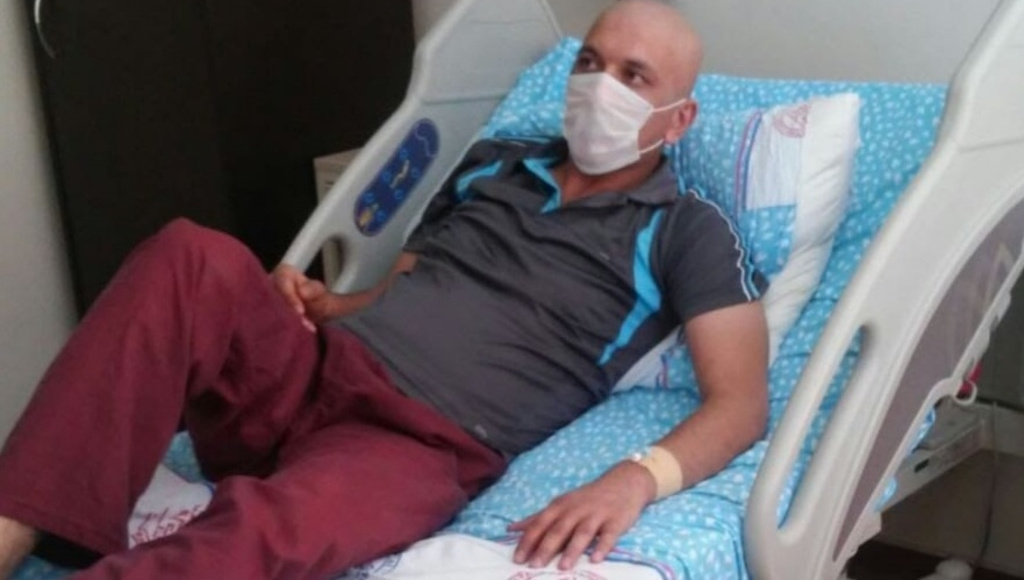The Turkish Council of Forensic Medicine (ATK) for the third time has issued a report saying an inmate with end-stage cancer is healthy enough to remain in prison, the Stockholm Center for Freedom reported, citing Bold Medya.
Yusuf Özmen has been suffering from metastasized testicular cancer for the last four years and is almost totally disabled. Özmen’s wife, Aynur Özmen, expressed outrage about the recent report on Twitter, saying she was “speechless.”
BUNU DA YAZSIN TARIH…!!!!! @ADLITIPKURUMU Kanser Hastası Eşime 3. Defa "CEZAEVINDE KALABILIR" diye rapor verdi. Artık diyecek birşey bulamıyorum. @adalet_bakanlik@gergerliogluof @myeneroglu @MSTanrikulu@Nesrinnas @MAliuludag_ @AtillaTasNet @sgokbakar
TutukluHasta Kalmasın pic.twitter.com/qiRJr4bP30
— Kanser Hastası YUSUF ÖZMEN'in eşi AYNUR ÖZMEN (@aynur_esi) March 22, 2022
According to the report Özmen’s disease was stable and his tumor had not grown since his last examination; therefore, he was in sufficiently good health to remain in prison.
A previous medical report signed by 40 doctors said Özmen was not fit to stay in prison. However, the ATK issued another health report in April 2021 saying he could remain incarcerated. The report added that the institute should be consulted if Özmen’s health continued to deteriorate.
As the number of sick prisoners dying in prison has increased, doubts about the credibility and independence of the council have grown, as the institution is affiliated with the Ministry of Justice.
Özmen was hospitalized in August when his heart rate increased to 200 bpm, after which he was placed in a quarantine cell by himself.
Özmen was arrested for alleged links to the Gülen movement. He was accused of using the ByLock smartphone application and sentenced to eight years, nine months in prison. The sentence was upheld by the Supreme Court of Appeals, and he is currently in a prison in eastern Erzurum province.
Turkey has considered ByLock, once widely available online, a secret tool of communication among supporters of the faith-based Gülen movement since a coup attempt in July 2016 despite the lack of any evidence that ByLock messages were related to the abortive putsch, leading to the arrest of thousands who were using it.
Turkish President Recep Tayyip Erdoğan has been targeting followers of the Gülen movement, inspired by Islamic preacher Fethullah Gülen, since the corruption investigations of Dec. 17-25, 2013, which implicated then-prime minister Erdoğan, his family members and his inner circle.
Dismissing the investigations as a Gülenist coup and conspiracy against his government, Erdoğan designated the movement as a terrorist organization and began to target its members. He intensified the crackdown on the movement following the abortive putsch in 2016 that he accused Gülen of masterminding. Gülen and the movement strongly deny involvement in the abortive putsch or any terrorist activity.
Human rights activists and opposition politicians have frequently criticized the authorities for not releasing critically ill prisoners so they can seek proper treatment. Human rights defender and Peoples’ Democratic Party (HDP) deputy Ömer Faruk Gergerlioğlu said ill prisoners were not released until they were at the point of no return.
According to the Human Rights Association (İHD), as of June 2020 there were more than 1,605 sick inmates in Turkish prisons, approximately 600 of whom were critically ill. Although most of the seriously ill patients had forensic and medical reports deeming them unfit to remain in prison, they were not released. Authorities refuse to free them on the grounds that they pose a potential danger to society.

